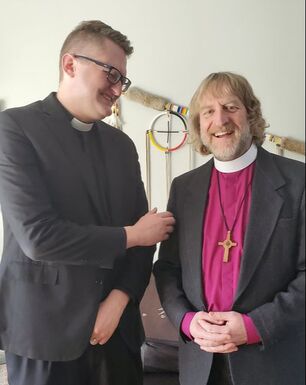 Fr. Adrian Martens (left) and Archbishop Gregory Kerr-Wilson (Anglican Diocese of Calgary) Fr. Adrian Martens (left) and Archbishop Gregory Kerr-Wilson (Anglican Diocese of Calgary) Do we still need to pray for Christian Unity? The annual Week of Prayer for Christian Unity will begin Saturday, Jan. 18. In many countries, Christians will gather in one anothers’ churches to pray. Since the 1960s, prayers and readings for the week have been jointly planned by the Vatican and the World Council of Churches. Christian unity was a chief goal of the Second Vatican Council and signified the lowering of barriers that caused pain within families, between spouses, and in the workplace. The significance of this ecumenical movement is not lost on Rev. Adrian Martens of the Roman Catholic Church and Anglican Archbishop Gregory Kerr-Wilson. So, have we been successful in attaining Christian unity? Archbishop Kerr-Wilson, Anglican diocesan bishop of Calgary and metropolitan of the ecclesiastical province of Rupert’s Land says there has been some success. There is a consensus that “we believe the same things. We have the same God. These similarities weren’t seen 50 or 60 years ago. However, the work is ongoing. Our goal should be to share at one table.” Rev. Martens, Ecumenical and Interreligious Affairs Coordinator in the Roman Catholic Diocese of Calgary says, “there have been wonderful strides and some dark periods in the history of Ecumenism. At times, we vary in our degree of Ecumenism. However, if we focus on being joined with Christ, other denominations will want to share much more.” So, while there seems to be some success in terms of dialogue and mutual understanding of other Christian denominations, has there been any tangible gains? Kerr-Wilson says “there have been many benefits to diverse Christian traditions. Different traditions have different strengths and emphasise different things. The Anglican Church went through several centuries with no Eucharist or mass unless you went to the early service for the most devout. The ecumenical relationship helped us to recover the benefit of seeing the Eucharist as the heart of Church worship. This is an example of receptive ecumenism, what we can receive from you that can deepen our own life in Church and faith in Christ. The gift of the other.” “…We need to realise that the other’s gift is our gift as well,” says Martens. In the eyes of both Kerr-Wilson and Martens, various Christian traditions and values from different areas and places around the world have helped the abundance of faith. Martens has seen a marked increase in the number of Christians from other countries. “There is also an increase in the number of Anabaptists, Hutterites and Mennonites.” One aspect of this growth is the level of fluidity between denominations. Kerr-Wilson notes that “some Anglicans from different countries find that the way they worshiped is more similar to a different denomination here e.g., the Nigerian Anglican expression is similar to a Pentecostal church. There are some positive and hopeful aspects of this fluidity as well as some troubling things. The positive is that we see Christian faith in the other. The negative is that we are leaning towards consumerism, ‘if I am not happy with what is going on, I can move somewhere else.’ There isn’t that commitment to persevere in the midst of the struggle, which is an essential part of the discipleship.” The looming question for Kerr-Wilson seems to be not whether we still need to pray for Christian unity, but rather, how can we act more together? “When we talk to each other, we need to recognize that we are not talking to a Catholic, Anglican or Presbyterian. We are talking to a brother in Christ, a sister in Christ. I have seen that when people engage in prayer and bible study together more regularly, that brings them closer together. I would love to see a monthly service where we gather as Christians to pray for others to come to the knowledge of Jesus Christ. We should be fueled by our faith to act together on social justice initiatives. Martens agrees that such joints actions will help remove barriers in families of mixed Christian denominations. “We can do more to make other denominations feel welcomed. Prayer is the best thing. We can lead the Prayer of the Faithful to pray for local churches.” By Nadia Hinds
0 Comments
Your comment will be posted after it is approved.
Leave a Reply. |
Author
Catholic Pastoral Centre Staff and Guest Writers Archives
July 2024
Categories
All
|
 RSS Feed
RSS Feed